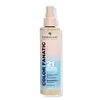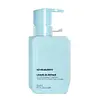What's inside
What's inside
 Key Ingredients
Key Ingredients

 Benefits
Benefits

 Concerns
Concerns

 Ingredients Side-by-side
Ingredients Side-by-side

Water
Skin ConditioningCocos Nucifera Oil
MaskingAmodimethicone
Polyquaternium-37
PPG-5-Ceteth-10 Phosphate
EmulsifyingPhenoxyethanol
PreservativePropylene Glycol Dicaprylate/Dicaprate
EmollientAcetamide Mea
HumectantSodium Hydroxide
BufferingParfum
MaskingLactamide Mea
HumectantDimethicone
EmollientPPG-1 Trideceth-6
Skin ConditioningButylene Glycol
HumectantTrideceth-6
EmulsifyingBehentrimonium Chloride
PreservativeXylose
HumectantEthylhexylglycerin
Skin ConditioningHelianthus Annuus Seed Extract
Skin ConditioningSorbitan Oleate
EmulsifyingLinalool
PerfumingDimethiconol
EmollientBenzophenone-4
UV AbsorberIsopropyl Alcohol
SolventCetrimonium Chloride
AntimicrobialTocopherol
AntioxidantCamelina Sativa Seed Oil
Skin ConditioningAscorbyl Glucoside
AntioxidantOlea Europaea Fruit Oil
MaskingBenzyl Alcohol
PerfumingGeraniol
PerfumingCitronellol
PerfumingBenzyl Salicylate
PerfumingHydrolyzed Vegetable Protein Pg-Propyl Silanetriol
Skin ConditioningIsoeugenol
PerfumingBHT
AntioxidantMelanin
Skin ProtectingSodium Benzoate
MaskingPentylene Glycol
Skin ConditioningPotassium Sorbate
PreservativeCitric Acid
BufferingWater, Cocos Nucifera Oil, Amodimethicone, Polyquaternium-37, PPG-5-Ceteth-10 Phosphate, Phenoxyethanol, Propylene Glycol Dicaprylate/Dicaprate, Acetamide Mea, Sodium Hydroxide, Parfum, Lactamide Mea, Dimethicone, PPG-1 Trideceth-6, Butylene Glycol, Trideceth-6, Behentrimonium Chloride, Xylose, Ethylhexylglycerin, Helianthus Annuus Seed Extract, Sorbitan Oleate, Linalool, Dimethiconol, Benzophenone-4, Isopropyl Alcohol, Cetrimonium Chloride, Tocopherol, Camelina Sativa Seed Oil, Ascorbyl Glucoside, Olea Europaea Fruit Oil, Benzyl Alcohol, Geraniol, Citronellol, Benzyl Salicylate, Hydrolyzed Vegetable Protein Pg-Propyl Silanetriol, Isoeugenol, BHT, Melanin, Sodium Benzoate, Pentylene Glycol, Potassium Sorbate, Citric Acid
Water
Skin ConditioningDimethicone
EmollientCaprylic/Capric Triglyceride
MaskingPanthenol
Skin ConditioningBromelain
Skin ConditioningPapain
Skin ConditioningHydrolyzed Pea Protein
EmollientLaurdimonium Hydroxypropyl Hydrolyzed Keratin
Skin ConditioningPelargonium Graveolens Flower Oil
MaskingCitrus Aurantium Dulcis Peel Oil
MaskingPogostemon Cablin Leaf Oil
MaskingEugenia Caryophyllus Leaf Oil
MaskingBambusa Vulgaris Leaf/Stem Extract
HumectantSimmondsia Chinensis Seed Oil
EmollientCinnamomum Cassia Leaf Oil
MaskingGlycerin
HumectantUbiquinone
AntioxidantSodium Laneth-40 Maleate/Styrene Sulfonate Copolymer
Cetyl Alcohol
EmollientIsopropyl Myristate
EmollientIsopropyl Alcohol
SolventPropylene Glycol
HumectantLaureth-7
EmulsifyingButylene/Ethylene/Styrene Copolymer
Ethylene/Propylene/Styrene Copolymer
Polyacrylamide
C13-14 Isoparaffin
EmollientBehentrimonium Chloride
PreservativePhenoxyethanol
PreservativeBHT
AntioxidantEthylhexylglycerin
Skin ConditioningChlorphenesin
AntimicrobialSorbic Acid
PreservativeBenzoic Acid
MaskingParfum
MaskingLimonene
PerfumingEugenol
PerfumingCinnamal
PerfumingGeraniol
PerfumingWater, Dimethicone, Caprylic/Capric Triglyceride, Panthenol, Bromelain, Papain, Hydrolyzed Pea Protein, Laurdimonium Hydroxypropyl Hydrolyzed Keratin, Pelargonium Graveolens Flower Oil, Citrus Aurantium Dulcis Peel Oil, Pogostemon Cablin Leaf Oil, Eugenia Caryophyllus Leaf Oil, Bambusa Vulgaris Leaf/Stem Extract, Simmondsia Chinensis Seed Oil, Cinnamomum Cassia Leaf Oil, Glycerin, Ubiquinone, Sodium Laneth-40 Maleate/Styrene Sulfonate Copolymer, Cetyl Alcohol, Isopropyl Myristate, Isopropyl Alcohol, Propylene Glycol, Laureth-7, Butylene/Ethylene/Styrene Copolymer, Ethylene/Propylene/Styrene Copolymer, Polyacrylamide, C13-14 Isoparaffin, Behentrimonium Chloride, Phenoxyethanol, BHT, Ethylhexylglycerin, Chlorphenesin, Sorbic Acid, Benzoic Acid, Parfum, Limonene, Eugenol, Cinnamal, Geraniol
 Reviews
Reviews

Ingredients Explained
These ingredients are found in both products.
Ingredients higher up in an ingredient list are typically present in a larger amount.
This ingredient is a preservative and often used for it's anti-static properties. You'll most likely see this ingredient in hair conditioners.
It does not cause irritation or sensitization in leave-on products at 1-5%.
BHT is a synthetic antioxidant and preservative.
As an antioxidant, it helps your body fight off free-radicals. Free-radicals are molecules that may damage your skin cells.
As a preservative, it is used to stabilize products and prevent them from degrading. Specifically, BHT prevents degradation from oxidation.
The concerns related to BHT come from oral studies; this ingredient is currently allowed for use by both the FDA and EU.
However, it was recently restricted for use in the UK as of April 2024.
Learn more about BHTDimethicone is a type of synthetic silicone created from natural materials such as quartz.
What it does:
Dimethicone comes in different viscosities:
Depending on the viscosity, dimethicone has different properties.
Ingredients lists don't always show which type is used, so we recommend reaching out to the brand if you have questions about the viscosity.
This ingredient is unlikely to cause irritation because it does not get absorbed into skin. However, people with silicone allergies should be careful about using this ingredient.
Note: Dimethicone may contribute to pilling. This is because it is not oil or water soluble, so pilling may occur when layered with products. When mixed with heavy oils in a formula, the outcome is also quite greasy.
Learn more about DimethiconeEthylhexylglycerin (we can't pronounce this either) is commonly used as a preservative and skin softener. It is derived from glyceryl.
You might see Ethylhexylglycerin often paired with other preservatives such as phenoxyethanol. Ethylhexylglycerin has been found to increase the effectiveness of these other preservatives.
Geraniol is used to add fragrance/parfum to a product. It is the main component of citronellol. It is a monoterpenoid and an alcohol.
Monoterpenes are naturally found in many parts of different plants.
Geraniol can be found in many essential oils including Rose Oil and Citronella Oil. The scent of Geraniol is often described as "rose-like". Many foods also contain Geraniol for fruit flavoring.
Geraniol can irritate the skin when exposed to air. However, irritation depends on the ability of geraniol to penetrate into the skin. In general, geraniol is not able to penetrate skin easily.
Geraniol is colorless and has low water-solubility. However, it is soluble in common organic solvents.
Like citronellol, it is a natural insect repellent.
2,6-Octadien-1-ol, 3,7-dimethyl-, (2E)-
Learn more about GeraniolIsopropyl Alcohol is more commonly known as rubbing alcohol. It is most commonly used as a solvent, meaning it helps other ingredients dissolve.
This ingredient is an astringent alcohol. Astringent alcohols may also irritate skin as they high amounts may strip away your skin's natural oils.
Other types of astringent alcohols include:
According to the National Rosacea Society based in the US, you should be mindful of products with these alcohols in the top half of ingredients.
Any type of sanitizing product will have high amounts of alcohol to help kill bacteria and viruses.
Learn more about Isopropyl AlcoholParfum is a catch-all term for an ingredient or more that is used to give a scent to products.
Also called "fragrance", this ingredient can be a blend of hundreds of chemicals or plant oils. This means every product with "fragrance" or "parfum" in the ingredients list is a different mixture.
For instance, Habanolide is a proprietary trade name for a specific aroma chemical. When used as a fragrance ingredient in cosmetics, most aroma chemicals fall under the broad labeling category of “FRAGRANCE” or “PARFUM” according to EU and US regulations.
The term 'parfum' or 'fragrance' is not regulated in many countries. In many cases, it is up to the brand to define this term.
For instance, many brands choose to label themselves as "fragrance-free" because they are not using synthetic fragrances. However, their products may still contain ingredients such as essential oils that are considered a fragrance by INCI standards.
One example is Calendula flower extract. Calendula is an essential oil that still imparts a scent or 'fragrance'.
Depending on the blend, the ingredients in the mixture can cause allergies and sensitivities on the skin. Some ingredients that are known EU allergens include linalool and citronellol.
Parfum can also be used to mask or cover an unpleasant scent.
The bottom line is: not all fragrances/parfum/ingredients are created equally. If you are worried about fragrances, we recommend taking a closer look at an ingredient. And of course, we always recommend speaking with a professional.
Learn more about ParfumPhenoxyethanol is a preservative that has germicide, antimicrobial, and aromatic properties. Studies show that phenoxyethanol can prevent microbial growth. By itself, it has a scent that is similar to that of a rose.
It's often used in formulations along with Caprylyl Glycol to preserve the shelf life of products.
Water. It's the most common cosmetic ingredient of all. You'll usually see it at the top of ingredient lists, meaning that it makes up the largest part of the product.
So why is it so popular? Water most often acts as a solvent - this means that it helps dissolve other ingredients into the formulation.
You'll also recognize water as that liquid we all need to stay alive. If you see this, drink a glass of water. Stay hydrated!
Learn more about Water